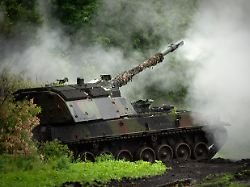Feedback still “very positive”
Rheinmetall boss admits losses of German weapons in Ukraine
6/10/2023 1:29 am
Russia recently celebrated the destruction of a Leopard 2 tank in Ukraine. Losses of German weapons in Ukraine come as no surprise to the head of the Rheinmetall armaments group. Nevertheless, the quality of the systems has proven itself – and sometimes even surprises the manufacturers themselves.
The head of Germany’s largest armaments group, Rheinmetall, Armin Papperger, has admitted losses in weapon systems that Germany supplied to Ukraine. At the same time, however, he praised their basic quality. “There are always losses in life,” said Papperger in an interview with the editorial network Germany (RND), but one does not talk about it. In principle, the weapons systems developed and produced in Germany have proven themselves in the Ukraine, emphasized the armaments manager.
“The feedback from the Ukrainians on the German weapons is very positive,” he said. Some of the manufacturers themselves were surprised by their stability. “Take the PzH2000 self-propelled howitzer, whose chassis and weapon systems were supplied by Rheinmetall. We actually say that the barrel has to be changed after about 4,500 rounds. But the Ukrainians fire up to 20,000 rounds – actually impossible,” says Papperger. “Other pipes would have buckled long ago.”
The EU’s promise to supply Ukraine with one million rounds of artillery ammunition for its defense against Russia within a year can only be fulfilled if governments fall back on their arsenals, said the Rheinmetall boss: “In the short term, Ukraine will have one million rounds of artillery ammunition only get if European armies make stocks available.”
The industry is working flat out to increase production capacities, but Rheinmetall itself wants to increase its artillery ammunition capacity from the current 450,000 rounds to 600,000 rounds per year in the next few months, Papperger explained. “However, it will take six to ten years before all European ammunition depots are filled.”
